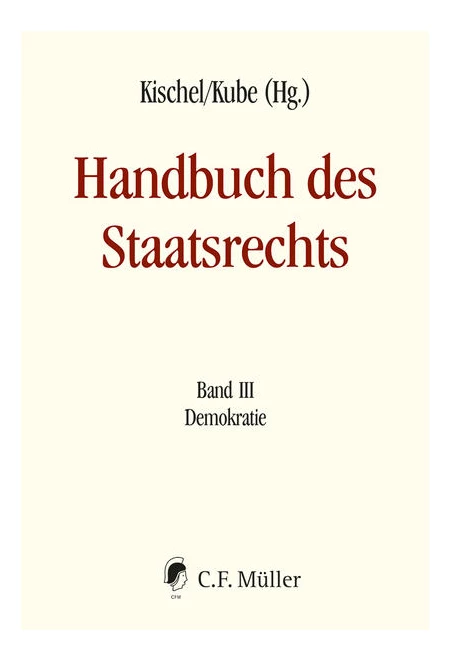Emanuel V. Towfigh, Parteikonzeptionen im Rechtsvergleich [Party Concepts in Comparative Law], in: Kischel/Kube (eds.), Handbuch des Staatsrechts [Handbook of Constitutional Law], Volume 3, 2025
In the third volume of the Handbook of Constitutional Law, Prof. Dr. Emanuel V. Towfigh comments under § 61 on party concepts in comparative law.
Summary
- Parties play a key role in modern state systems, both in democratic and authoritarian regimes. They are part of the institutional inventory of government systems and, as “sluices” between state and society, are essential factors in constitutional organization. The scheme for determining how parties operate in various government systems can be derived from its functions and varies depending on the political and constitutional order within which it operates.
- Parties are found in all political systems worldwide. This predestines them for a cross-jurisdictional consideration which takes into account their role in discourse (as organized, rational groundwork for political decisions), politics (as binding decisions sanctioned by the state monopoly on the use of force, and its oversight) and personnel (as selection and oversight of political decision-makers).
- At the center of democratic models of governance is the sovereignty of the people: The state’s monopoly on the use of force finds its origin and justification in the demos; the constituted state power must be traceable back to it. This sovereignty is exercised by the state community by means of referendums (direct democracy) and elections (representative democracy). Parties play an important mediating role in these proceedings. How they fulfil this role depends, among other things, on whether they are actors in a parliamentary, presidential, or direct democracy. They act differently in a consensus or consociational democracy than in a competitive system.
- In Germany’s parliamentary democracy, the mediating function is particularly pronounced; through their members, the parties are rooted in society; their parliamentary representatives build a bridge to the state’s sphere. In Switzerland’s consociational democracy, parties are one actor among several in the decision-making process, which leaves them in a weak overall position within the political system. Parties in the USA, on the other hand, which are designed primarily to contest political elections, do not have a distinct membership structure; the parties therefore perform the intermediary function primarily through their representatives in Congress. The EU’s party system gives its parties even less influence than this. The construction of the European parties as umbrella organizations, their lack of individual members, and their dependence on national member parties make it almost impossible for them to play an effective mediating role.
- In the non-democratic systems of China and the German Democratic Republic, “rule by party” is the ideological basis for legitimizing state action. In these ideologically determined party states, the party, as a centralized hierarchical organization, assumes the leading role over all branches of government, society and economy, and has the sole decision-making power in all these areas. An aggregation of different interests as in a competition of opinions to form a common will is not required in these orders; the common will is substituted by an elitist party doctrine which paternalistically claims to internally harmonize the needs of the individual and the community by virtue of its superior reason.
- The concept of “party” is by its very nature an instrument of power. In democratic systems, this instrument of power is contained and democratized by liberal-democratic basic principles such as elections, a guarantee of party plurality, and the requirement that parties have democratic internal structures. However, parties exist in a state of tension between the mediation of democratic legitimacy through the inclusion of as many interests as possible on the one end, and the exercise of actual governing power, inherently pulling it towards oligopoly and monopoly on the other end. The different concepts of political parties in a democracy and in an authoritarian state can thus be understood as two ends of a spectrum of party conceptions.
- Authoritarian populist parties exploit this tension by attacking democracy and “party cartels” through dishonestly conflating a critique of these two poles of the area of tension with the accusation of being simultaneously ineffective (because unlike authoritarian parties they are not only about effective exercise of power) and undemocratic (because they are also about the exercise of power, not only about mediation and inclusion of interests). As a result, parties find themselves in a dilemma in which the democratic party-state can only lose. There are no protective mechanisms directly embedded in the party system which can be used to counter anti-constitutional efforts. Democratic party systems depend on the defense of the fundamental principles of the democratic constitutional state, but these can only offer protection as long as the consensus on their inviolability is not challenged and undermined – by populists, for example.
